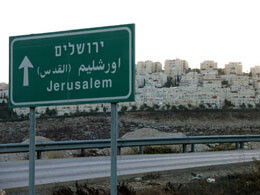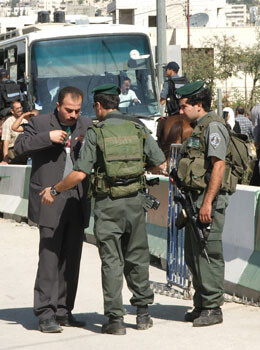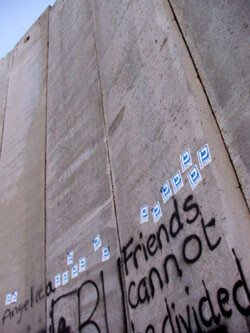
“Grab the hilltops”: Sharon’s legacy is such settlements as Pisgat Ze’ev (pictured). During his premiership, settlement building was escalated around East Jerusalem, and the Judaization of the city is marked by the roadsigns in which the Arabic reads the Hebraized “Yerushalayim” and only features the Arabic name for Jerusalem “Al-Quds” in parentheses (Maureen Clare Murphy)
The streets of Ramallah had a festive atmosphere last weekend as people bustled about the main commercial drag buying goods for this week’s four-day holiday Eid al-Adha. Campaign banners fluttered in the main square, and music blasted from political parties’ offices as official campaigning had just begun for the much-anticipated legislative elections to be held at the end of the month.
However, conversation hushed in one corner shop in Ramallah’s old city when there was a televised update from Hadassah hospital in Jerusalem, where Israeli Prime Minister Ariel Sharon has been lying in a medically induced coma that will most likely be the end of his political career, should he survive. “Sharon made life very difficult,” said the shopkeeper, who wished to remain unnamed. “He was not a man of peace. He loves war. He loves killing. He [committed] so many crimes, especially in Lebanon.”
Remembered by the Palestinians as being a military man, Sharon joined the Haganah (which later became the Israeli Defense Forces or IDF) at the age of 14 and fought in what Israeli considers its war of independence but what the Palestinians call the nakba, or catastrophe, as it marked the Palestinian population’s expulsion from and the dispossession of their land.
Later on, in 1953, a unit of the IDF under Sharon’s command killed 69 civilians and blew up 45 houses in the West Bank village of Qibya. Sharon has also been connected to the massacre of 270 Egyptian prisoners of war around the time of the Suez War, and orchestrated Israel’s invasion of Lebanon, which was dubbed “Israel’s Vietnam” as tens of thousands of Lebanese and Palestinian civilians, as well as Israeli forces, were killed.
But for Palestinians the world over, Sharon is best remembered for his involvement in the September 1982 brutal massacre of hundreds of Palestinian refugees in the Sabra and Chatila camps in Lebanon. The shopkeeper is quick to point out what many western news reports and politicians don’t - that Sharon, then Israeli minister of defense, was found indirectly responsible for the humanitarian catastrophe by an Israeli commission.
“Mr. Sharon was not a man that the Palestinian people in general liked. He’s identified in the mind with Sabra and Chatila, Qibya … and many other massacres and horrible days. He’s also identified … with settlements and the building of new settlements,” said Dr. Nabil Sha’ath, deputy prime minister of the Palestinian Authority.

The daily humiliation suffered by Palestinians at Israel’s numerous checkpoints feeds the bitterness towards Sharon that is felt by many (Maureen Clare Murphy)
“[Sharon] was a war criminal as much as Milosevic. To the Palestinians, he was as Hitler was to the people of Europe,” said Rahmeh Mansour, who works in Palestinian civil society and is part of the women’s movement. “We never forget Sabra and Chatila; we never forget his role in displacing the Palestinian people in 1948 and setting off the Al-Aqsa Intifada … He should be tried like any other war criminal.”
Husam S. Madhoun, Media and Information Coordinator for the Palestinian organization Miftah, said that on a human level Miftah wished Sharon a quick recovery, but reiterated the general perception of Sharon as being responsible for many rights violations suffered by Palestinians. “What does Sharon mean or represent to Palestinians? His past is more than just controversial … He’s the father of settlement building and his list of war crimes is quite a long list,” he said.
And while Dr. Sha’ath did say “there are very human considerations” in regards to Sharon’s condition, and “that’s why President Abbas voiced his concern and his sympathy,” he stated that “Sharon’s only deed for which he can be remembered not negatively is his withdrawal from Gaza.”
However, Israel’s unilateral withdrawal “is not a perfect deal and most of the people in Gaza still suffer serious problems because of the siege that they left Gaza in,” Dr. Sha’ath explained. “[Sharon’s] plans for the future were always far away from the minimal expected requirements of the Palestinians and the international community for the future of the peace process and what could be a permanent settlement.”
To the Palestinians, Sharon also symbolizes the double standards and injustice that characterizes the international community’s treatment of the Israeli-Palestinian conflict. Palestinians are still smarting from US President George W. Bush’s description of Sharon as a “man of peace” just after Israel’s incursions into the West Bank in 2002 that was Israel’s largest offensive there since it occupied the territory in 1967.
Palestinian legislator Dr. Hanan Ashrawi observed that Sharon was able to reverse his reputation as “a war criminal into a man of peace,” and that he was able “to take control of the Palestinian arena entirely.” She added, “Sharon created unilateralism … and he’s the one to make hard-line policies [vis-a-vis the Palestinians] seem sensible and mainstream.”

Unless the Annexation Wall is torn down and the entire infrastructure of Israel’s occupation is dismantled, Palestinians will not experience any major change after Sharon’s absence from Israeli politics (Maureen Clare Murphy)
Dr. Ashrawi was not alone in this opinion. “[Sharon’s] never been a man of peace,” said Mansour. “I’m surprised that the newspapers call him a man of peace.”
Dr. Mustafa Barghouthi, who like Dr. Ashrawi and Dr. Sha’ath is currently seeking a seat in the legislative council, also expressed frustration with the mainstream corporate medias’ treatment of the developing story. “The media is not paying attention to Palestinian suffering,” he said, “Everything is approached from the Israeli perspective. It’s not fair.”
Speaking from Falamya, a West Bank village that had its agricultural land confiscated by Israel for the building of its Annexation Wall, Dr. Barghouthi said that while all Israeli prime ministers have been bad to the Palestinians, Sharon “was much smarter … He did represent Israeli plans to [transition] the occupied territories to a place of Apartheid.”
Dr. Barghouthi spoke for many when he said, “With [Sharon] it was bad, and with other [Israeli prime ministers] it will be bad.” He added, “Unless we see a government of Israel that ends the occupation, we won’t see change.”
While Palestinians in the Israeli-occupied West Bank and Gaza were “in limbo,” Madhoun said, “we don’t expect any major changes,” explaining that “there’s a few things that can be very sure … the continued checkpoints, Israel’s policy of targeted killings, the economic and social closure of the West Bank, Gaza Strip, and Jerusalem, Israel’s destructive policy towards the Palestinians through the construction of the Wall, the continued expansion of settlements and maybe the creation of new settlements.”
Dr. Ashrawi believes that after an initial demonstration of national unity in Israel, “people might go back to their parties,” and that with the Israeli polls, “everyone’s going to try to prove they can outdo Sharon … and take more hard-line positions. The elections will produce a competition to show who can be more harsh to the Palestinians.”
Dr. Sha’ath said, “Israeli leaders have tried to cover up the effect of the intifada on Israeli politics, and the best man to cover [this] up was Ariel Sharon. But the fact that he left [Likud] and went center from the extreme right is a reflection of his estimation that the Israeli people are moving to the center. I don’t think any Israeli government can get the support of the Israelis unless it has the promise of a peace program.”
He added, however, “if there is a reversion to unilateralism and Netanyahuism, then things will be worse,” but that “we hope that it’s not a dead end, and that the new man in charge will have a peace program because that would lead to even better relations.”
Back in the Ramallah corner shop, while the owner said, “I don’t want Sharon to die … I want him to suffer for two to three years,” he wishes that “some other leaders come and sit down with the Palestinians. I hope that the one who comes after Sharon will be good for the Palestinians and the whole world.”
However, his friend, an accountant who also wished to remain unnamed, was less optimistic. “The one after Sharon will be the same,” he said. “The Israelis don’t want peace.”
Echoing the shopkeeper’s bitterness, Mansour believes that Sharon’s death is some small justice from God for all that Sharon has put the Palestinians through without being held accountable. Noting that the front page of the Saturday edition of the major Palestinian daily Al-Quds features a picture of a village woman crying over her olive tree that had just been cut down by Israeli settlers, Mansour said, “When Israeli settlers cut up their tree … every leaf of this tree is crying for justice. [Sharon’s death] is just a little bit of justice.”
Meanwhile, for the Palestinian citizens of Israel, the response was muted. “In general, the Palestinian citizens of Israel feel that what we have now will be [the same] in the future … all of us will be stuck in the same situation for several years,” said Ja’far Farah, director of the Mossawa Center, which advocates for the rights of the Palestinian citizens of Israel.
Expressing dismay at the simultaneous celebrating by Palestinians in the Gaza Strip regarding what appears to be Sharon’s impending death and the statements of sadness and sympathy being issued by the Palestinian leadership in Ramallah, Farah said, “We will not be celebrating [and yet] will not be sad … Both reactions are strange.”
Related links
Currently based in Ramallah, Maureen Clare Murphy is Arts, Music and Culture editor for the Electronic Intifada



